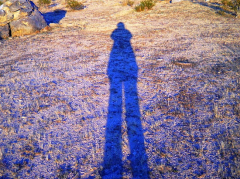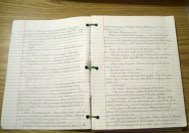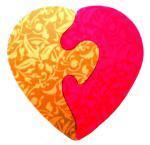Pat Bertram's Blog, page 263
August 2, 2012
How to Begin Writing a Novel
 A woman left a comment on a writing discussion today saying she decided she wanted to write a novel, then she requested advice on how to begin.
A woman left a comment on a writing discussion today saying she decided she wanted to write a novel, then she requested advice on how to begin.
My advice?
Write a word. Any word. That’s all it takes to start writing.
A book begins with a single word. Many novice writers get intimidated by the thought of writing an entire book, but all you ever need to write is one word. I know that’s not much of a goal, but in the end, it is the only goal. That’s how every book all through the ages got written — one word at a time. By stringing single words together, you get sentences, then paragraphs, pages, chapters, an entire book.
So, to begin with, just write. Get a feel for words. Read fiction. Get a feel for how a story flows. Once you are in the habit of writing, read books on how to write. Sometimes it takes a long time for it all to click. I’d written two and a half books, read dozens of books on how to write in addition to the thousands of novels I’d read, before it all clicked. Most of what the how-to-write books said didn’t make sense at first. Rising conflict? Stakes? Showing? Telling? I hadn’t a clue what they meant, but I stuck with it, and became a good writer. I’m not naturally talented, but I discovered that it is possible to learn the craft. Don’t let anyone tell you otherwise.
Writing is not always about writing. Sometimes it’s about thinking. Some authors can sit down and let the words flow and lo! There is a story! Other authors write extensive outlines, detailing the entire story before they ever set one word to the page. I don’t do either. I think about what story I want to write and why I want to write it. I figure out who the main characters are, what they want, how they are going to get it, who is going to stop them getting it. I figure out the beginning and the end (because I need to know where to begin and where I am going), and I figure out a couple of scenes in the middle, to give me an idea of how to get there. Then write. I am a very slow writer, but still, being a slow writer, I’ve written five books that have been published.
The best skill to learn after you’ve written your book is how to rewrite. Chances are, you dumped too much information in the first chapter because you assume people need to know everything about your character before they can understand her, so usually the first thing you do in rewriting is dump the first chapter. But to rewrite, you have to have written. So just write. And write what you want. Writing is all about practice. A person who wants to learn how to play the piano doesn’t just sit down at a piano and immediately start playing. You have to learn the basics, have to practice, but still, you can plunk at the keys to get a feel for piano playing. The same thing goes for writing.
All too often, inexperienced writers tiptoe through their novels, letting major events — fistfights, gunplay, murders, betrayals — take place off-page. It’s much easier to let characters emote afterward than for the writer to take the time and trouble to tackle the action scene. I know I have passed on opportunities to create such scenes, thinking the characters’ reactions all-important, but I forgot one thing: readers need to experience the drama.
Sometimes it’s hard to find the confidence to bring such complex scenes to life, to juggle the many elements that comprise an action scene, but the only way to learn is to plunge headfirst into action. Write it fast and fearlessly; let the words fall where they may. You can always clean up the mess in rewrites.
And while you’re at it, don’t forget to study the publishing business. Learn everything you can about good prose, story elements, query letters, promotion. With so many millions of people out there who have written a book or who want to write a book, the competition is fierce. A writer does not attain maturity as a writer until he or she has written 1,000,000 words, or so they say. (I’m only halfway there.) So write. Your next book might be the one that captures people’s imaginations and catapults you into fame and fortune. Not writing another book guarantees you will never will reach that goal. It also keeps you from doing what you were meant to do.
Tagged: beginning to write, learning to write, outlining a novel, practice writing, rewriting, writing a novel

August 1, 2012
Protecting Myself from the Sun, Rattlers, and Weird Old Dentists
 I took my father to the dentist the other day. When we were out in the waiting, getting ready to leave, my father told that weird old guy that I often walked in the desert for a couple of hours at a time.
I took my father to the dentist the other day. When we were out in the waiting, getting ready to leave, my father told that weird old guy that I often walked in the desert for a couple of hours at a time.
The dentist said, “Come here.” Um, yeah . . . like I’m going to do what a weird old guy says. For all I know, he could have instruments of torture he wanted to try out, or ancient dental equipment he wanted to use up.
I backed away, and he shook his head at me and said, “Have you ever seen skin cancer?”
I admitted I hadn’t.
“I want to show you what it looks like,” he said. “Come here.”
I stood my ground, so he called one of his assistants to the front, grabbed her by the arm and said, “Look.”
The woman had two small sores close to the elbow on her left arm. She told me it was skin cancer, that people who drove were prone to getting cancer on the left arm because of its exposure to the sun through the driver’s side window, which probably is true, but she also had the leathery skin of a person who’d once spent too much time sunbathing and who thought a sun visor sufficed for a hat.
He dismissed his assistant, then said, “That’s what the sun can do to you.”
“Do I really look stupid?” I asked.
He just frowned at me, and said, “I didn’t say you were.”
I told him I could take care of myself and left. The guy was not a doctor, he was a dentist, and not even my dentist. He could see I wasn’t tanned, or at least that my face wasn’t, since the rest of me was covered up, so why the concern? I mean, I’d only just met the guy.
I am not one of the fashionably unclad. I don’t wear short shorts, cropped tops, and flip-flops, and I especially don’t wear such things outside. If you saw me in the summer sun in my long pants, long-sleeved and high-necked shirts, my sturdy shoes and socks, my broad brimmed hat, my hand coverings, my face shiny from day cream with sunscreen, walking stick, a bottle of water in one pocket, my cell phone in another pocket, you’d probably think I was weird, but the truth is, I dress properly for the desert. Because of life’s ironies, I realize I will probably get skin cancer before my deeply tanned sister does, but I do the best I can to protect myself. (There is nothing one can do to protect against those ironies that life seems to delight in.)
Admittedly, the walking stick isn’t a garment, but it is necessary for hiking in the desert — it helps me keep my balance on steep rocky slopes, and it could provide some protection if I were to meet a rattler up close. I also make a point of never leaving the house without a bottle of water and my cell phone. Although many people around here treat the desert as if it were a cross between a park and a city dump, I never forget that I am an interloper in a wild place.
Tagged: cancer from driving, desert protection, life's ironies, skin cancer, sun protection

July 31, 2012
Portraying Grief Correctly
So often writers get grief over the loss of a spouse wrong, perhaps because unless you have been there, you cannot know the global effect grief has. There are so many mental, emotional, spiritual, physical, even geographical changes thrown at you that it’s almost impossible to understand what is happening.
Grief that has matured, meaning grief that is no longer new and raw, is easier to portray, but even that is often done wrong, since the characters seem to have no yearnings. And grief is so much about yearnings.
One movie that portrayed long time grief well was The Last Dance with Maureen O’Hara and Eric Stolz. O’Hara teared up when she thought of her husband, she treasured the records she had bought of the songs they had danced to (calling them her “memories”), but most of all, she yearned for one last dance from him. And that yearning made her grief real. We who have lost our mates eventually come to terms with going on alone, but we all have yearnings for one last kiss, one last hug, one last smile, one last word. Such simple things, but being deprived of them underscores our loss.
Another example of grief done right occurred in the old television show Golden Girls, of all places. In that particular episode, Blanche dreams that her husband, dead for nine years, comes home. This is a recurring dream, but instead of bringing her sadness as always, this time the dream brings her peace because in the dream, she got to hug him one last time.
 Even though I am doing well two years and four months after the death of my life mate/soul mate, I still yearn for one last smile from him, one last hug, one last visit with him at his store where we met. It seems impossible these yearnings will go unfulfilled for the rest of my life. Like Maureen O’Hara’s character, though, I have my “memories” but in my case they are not shared songs but movies he taped. I’ve been going through his movies, weeding out the ones I will never watch again, and each movie I am keeping makes me remember a conversation we had about the movie, a particular time we watched them, a feeling I once had when he watched the movie with me.
Even though I am doing well two years and four months after the death of my life mate/soul mate, I still yearn for one last smile from him, one last hug, one last visit with him at his store where we met. It seems impossible these yearnings will go unfulfilled for the rest of my life. Like Maureen O’Hara’s character, though, I have my “memories” but in my case they are not shared songs but movies he taped. I’ve been going through his movies, weeding out the ones I will never watch again, and each movie I am keeping makes me remember a conversation we had about the movie, a particular time we watched them, a feeling I once had when he watched the movie with me.
Many of the movies he taped toward the end of his life, like The Last Dance, are about people going on alone after the death of a mate. It almost seems as if he is/was trying to help me find my way through the horror to a new peace. Some of these movies, again like The Last Dance, he edited to take out the parts he didn’t like. So not only do I have movies he taped, I have versions no one else in the entire world has. For example, he edited out all the flashbacks in The Last Dance, so I never see Maureen O’Hara’s young husband. I only know him through her love, her tears, her feelings about the possessions she is getting rid of in preparation for her own death, and in the stories she tells Eric Stolz and his family. This makes for a stronger story, keeping it all in the present, and it makes the relationship between O’Hara and Stolz more compelling.
But more than that, it makes it my story, a story about a woman yearning for one last moment with the man she loved.
Tagged: Eric Stolz, grief and yearning, loss of a spouse, Maureen O'Hara, The Last Dance, yearning for one last moment

July 30, 2012
A Gift From the Universe
 I’m continuing my experiment in sanity, doing the same thing over and over again and expecting different results, so as usual today, I went for a walk in the desert, following the same rocky paths I’d trodden the past few days. It was exceedingly hot, much hotter than yesterday or the day before, and I was drenched in sweat by the time I got to my standing spot — the spot where I stood the past couple of days and let myself just be.
I’m continuing my experiment in sanity, doing the same thing over and over again and expecting different results, so as usual today, I went for a walk in the desert, following the same rocky paths I’d trodden the past few days. It was exceedingly hot, much hotter than yesterday or the day before, and I was drenched in sweat by the time I got to my standing spot — the spot where I stood the past couple of days and let myself just be.
The air was still. I heard the far-off whine of an airplane, the faint alarm of a distant piece of heavy equipment backing up, the buzz of a fly as it whizzed past my head. Today I saw no jackrabbit, no humans. There was just me, those few slight sounds, the desert knolls surrounding the area, the creosote bushes dotting the sandy expanse, the hot still air, the clear blue sky.
I quieted my thoughts, then after a minute or so, I spoke my new mantra.
This “mantra” appeared when I tagged my article Being Where I am Supposed to Be. I used the tags “being happy,” “being me,” “being where I am supposed to be,” and I had to smile at the sappy little ditty those tags formed. So today, out there in the desert, in the still of the heat, I said, “I am happy. I am being me. I am where I am supposed to be.” As soon as I finished speaking the word “be,” a cool current of air flowed by.
I stood there, blissfully comfortable, until the air stilled again, then I continued my walk.
I do not believe in signs or intentional gifts from the universe. The truth is, a small breeze shows in up the desert at about that same time every day, and the timing was entirely coincidental. (People think I’m silly for walking in the desert heat, but that mid-morning breeze makes the desert cooler than the city.)
Still, intentional or not, coincidental or not, that coolness was a wonderful gift, and it made me realize that once again, I was exactly where I was supposed to be. It also proved my point, that as long as one is not indulging in self-destructive or insane behavior, sanity is doing the same thing over and over again and expecting different results.
Tagged: being happy, being where I am supposed to be, desert knolls, desert walk, experiment in sanity, mantra

July 29, 2012
Insanity, Alchemy, and Me
 It’s been said that the definition of insanity is doing the same thing over and over and expecting different results, but the saying only holds true when referring to insane or destructive behaviors. In our normal lives, we constantly do the same thing over and over, expecting different results . . . and we get them. We rise at the same time each morning, eat the same breakfast, drive the same way to work, go to the same job, but we don’t expect each day to be exactly the same as the day before. It can’t be the same — there are too many variables.
It’s been said that the definition of insanity is doing the same thing over and over and expecting different results, but the saying only holds true when referring to insane or destructive behaviors. In our normal lives, we constantly do the same thing over and over, expecting different results . . . and we get them. We rise at the same time each morning, eat the same breakfast, drive the same way to work, go to the same job, but we don’t expect each day to be exactly the same as the day before. It can’t be the same — there are too many variables.
In a closed system, perhaps, the saying would hold true, but since there are no closed systems, we normally get different results. Writers and other creative people experience this every day. We sit in the same place, pen in hand or fingers on the keyboard, and open our selves up to the creative process. Sometimes the words flow and sometimes they don’t. Athletes deal with differences in performance, sometimes they are in the zone and everything is perfect, and sometimes, though they do exactly the same thing as always, their performance is off.
This expectation of different results was the basis for alchemy. We picture the alchemists doing the same procedure repeatedly to perfect their experiment, but the truth is, they did the same thing over and over again in exactly the same way in the hope of getting different results. Sometimes everything came together as they hoped, and they got the desired results, transforming lead into gold or themselves into a higher form of life or atoms into energy. (Or so the legends say.)
Why would the alchemists expect different results by doing exactly the same thing? Because they knew they did not live in a closed system. The earth hurtles around the sun at 67,000 mph. The sun hurtles around the galaxy at 140 miles per second. The entire universe is also moving and expanding, so from one second to the next we are in a completely different place with a possibility of different factors. Add in more localized variables, such as humidity, temperature, sun spot activity and solar winds, and it would seem insane to do the same thing over and over again and expect the same results.
After my moment of happiness yesterday, when I could feel that I was exactly where I was supposed to be, doing exactly what I was supposed to be doing (simply “being”), I decided to do the same thing again today. Not surprisingly, the results were different. I stood in the same place, repeated the same mantra (“I am happy”), felt the breeze and the heat, smelled the sun-warmed creosote bushes, inhaled the clean air. It was nice, and I felt peaceful, but there was no moment of clarity as there was yesterday. I truly did not expect the same results. I know about variables. The day was hotter, the sky a paler blue, no jackrabbit loped by but humans in their motorized vehicles were driving around disturbing the air currents and creating sound vibrations. I might not have slept as well as I had the previous night, or perhaps I’d dissipated my mystic energies in exercising before going for my walk, which I didn’t do yesterday. Still, it felt good standing in the desert, doing nothing but being, so I intend to do that very same thing over and over, expecting different results each time. And therein lies sanity.
Tagged: alchemy, closed systems, definition of insanity, desert walk, insanity, variables in life

July 28, 2012
Being Where I am Supposed to Be
 I was happy today. I didn’t feel giddily gleeful, just a quiet peace that came from knowing I was where I was supposed to be.
I was happy today. I didn’t feel giddily gleeful, just a quiet peace that came from knowing I was where I was supposed to be.
I’d been walking in the desert, ruminating over my petty concerns. I have no major problems at the moment — I have a place to stay and food to eat, and I feel no great lingering sorrow over the death of my life mate/soul mate — but there are small matters that niggle at me. I seem to have crossed some invisible line where I no longer attract people through my words, but am actually starting to repel them — people have been blocking me on Facebook, and often it’s because of a simple non-combative comment I made in one of my discussion groups. I also wonder how to entice people to read my books, and I still ponder the whole issue of my writing. Although I am coming to an accommodation with continuing to write despite lackluster sales, I still am not comfortable with the idea of being a writer among millions of other writers — never have liked being a face in the crowd.
So there I was, walking, thinking, talking a bit to my deceased mate, when it suddenly dawned on me that at that very moment, I was not a face in the crowd. There was no crowd — just me. I stopped and looked around. A jackrabbit loped by, but other than that, no creature made itself known. I felt the breeze cooling my sweat, heard the air whistling faintly as it passed my ears. I stilled my thoughts and simply stood there in the middle of the desert, deep blue skies above, sun-warmed soil beneath the soles of my shoes, desert knolls surrounding me and blocking any view of the nearby city.
A friend who has endured far worse grief than I have, told me that she is finding peace by telling herself that she is happy. Alone out there in the desert, I decided I was finally ready to take the next step in going on with my life, so I thought, “I am happy.” And I realized that was the truth of it. Right then, I was happy. I had no sense of longing for something or someone, no sense of waiting. My entire life — all the joys and pains, the learning and creating, the loves and losses — had led to that very moment, and I felt as if I had arrived where I was supposed to be. There was no reason for me to be there, nothing to for me to do, no task to accomplish. All I had to do was simply . . . be.
One cannot stand in the middle of the desert forever, so eventually, I continued my walk, still feeling the effects of that moment. There are few perfect moments in life, but that was one of them. (I’m smiling as I write this. Can you tell?)
Tagged: a face in the crowd, being happy, being me, being where I am supposed to be, deep thoughts, jackrabbit

July 27, 2012
Is it Better to Write for Yourself or to Write for Readers?
 For many writers, maybe even most, finding a readership is crucial. They write to entertain, which they cannot do without readers. Or they write to communicate, which they also cannot do without readers. Or they write to sell so they can continue to write, and for that, they need not only readers but customers — readers who are willing to buy books.
For many writers, maybe even most, finding a readership is crucial. They write to entertain, which they cannot do without readers. Or they write to communicate, which they also cannot do without readers. Or they write to sell so they can continue to write, and for that, they need not only readers but customers — readers who are willing to buy books.
The lucky writers are those who write the books they love and the books they love just happen to be the books readers want to read and buy. The rest of us have a conundrum to deal with — do we write the books we need to write, regardless of what readers want, or do we try to write the books we think readers will read?
In discussion after discussion, writers put forth the idea that to get readers, one must write what readers want. And perhaps that is the smart and lucrative way to write, but it’s not the only way. Besides, if I look at the situation from my point of view as a reader, it seems a cheat. I want a story filtered through the writer’s life/voice, not something the author thinks I would like.
In my case, I have no choice — I can only write the stories that speak to me. Even if I wanted to write solely in the hopes of getting a large readership, I’m not sure I could do it. Readers can tell when they are being pandered to, though there are exceptions to this, most notably a couple of now very wealthy men who write romances for women. For some reason, most women don’t feel the manipulation of those books and so fall in love with the stories, while others, perhaps less interested in the romance genre, hate the feeling of someone trying to tug on their emotions by writing books they think women would like. To a certain extent, all books are manipulation — authors write in such a way to elicit emotional reactions from readers — but sometimes, like with these men, the tugs are quite apparent.
Writers who also read the genre they love know the nuances of the genre (assuming, for example, there are nuances in category romance) and so can more easily write to their readers tastes. But what if you can’t write genre fiction (or, more probably, can’t force yourself to write it)? You end up writing for yourself.
There might not be money to be made by writing for oneself, but there are other advantages. For one thing, you can make your writing as intelligent as you wish without having to worry about losing your audience. For another, there will always be one person who loves your work — you. And there is a third reason, perhaps the most important: We are so much more than we know, and writing is a way of communicating not just with readers, but with the unknown us. If we just write what we know we know, we are the poorer for it. And maybe, just maybe, by writing the book only we can write, we will end up writing something spectacular.
Tagged: for whom do you write, reasons to write, why write, write for readers, write for yourself

July 26, 2012
Who Wants to be a Character in a Book?
 Grief: The Great Yearning is a compilation of blog posts, letters, and essays I wrote while struggling to survive the first year of grief after the death of my life mate/soul mate. We’d been together almost thirty-four years. I thought I was prepared for his dying, but his death shattered me beyond anything I could ever have imagined. The only way I could survive the agony was to write about it. Although Grief: The Great Yearning is non-fiction (obviously), it has all the elements of great fiction — emotion that weeps off the page, a conflicted character who yearns desperately for something, a love that lives on even after death.
Grief: The Great Yearning is a compilation of blog posts, letters, and essays I wrote while struggling to survive the first year of grief after the death of my life mate/soul mate. We’d been together almost thirty-four years. I thought I was prepared for his dying, but his death shattered me beyond anything I could ever have imagined. The only way I could survive the agony was to write about it. Although Grief: The Great Yearning is non-fiction (obviously), it has all the elements of great fiction — emotion that weeps off the page, a conflicted character who yearns desperately for something, a love that lives on even after death.
Such is the pendulum swing of life that now, one year and four months after the publication of Grief: The Great Yearning, I would no longer make a good character in a book. I have no real wants or desires; no wishes, dreams, or hopes; no great love (no hate, either). I have nothing to avenge, no strong beliefs, no regrets, no guilt, no fears, no anger.
From the beginning, I’ve been bewildered by my lack of change. Shouldn’t such a soul quake cause ripples of change forever after? I didn’t feel any different, but apparently changes were taking place. All the conflicts of my life seem to be in hiatus, as if the slate of me was wiped clean to make ready for the changes that will be coming to my life. Some of the changes will come because of decisions I make, others changes will simply happen as the rest of my life unfolds.
Character change in itself is not enough either to pilot a story or to plot a book. Change in a character is generally the result of other actions, and shows us how the events of the story affect the character. So, basically, a book needs to begin with a compelling character, and I am missing all the elements that makes a character compelling. On the other hand, since I am not a character in a book, I will enjoy this hiatus from conflict and strong emotion. I mean really, who wants to be a character in a book? Life is hard enough without having to deal with all the torments we put our characters through.
Tagged: change in characters, change in life, characters, great characters, Grief: The Great Yearning

July 25, 2012
Searching for New Loves
 In the wake of my grief, now that the worst of my pain for my life mate/soul mate has burned itself out, I am left with . . . emptiness.
In the wake of my grief, now that the worst of my pain for my life mate/soul mate has burned itself out, I am left with . . . emptiness.
Most of the things I once cared about are gone. Not just him and our shared life, but completely unrelated matters I once cared about are gone too. I loved reading — it was always the only thing I ever wanted to do — but first the major publishers started the process of killing off my love for reading by producing such mediocre books, and then the indie movement gave my love the fatal blow by outdoing the major publishers in mediocrity. I know there are good book out there, but I no longer have any interest in wading through the muck to find the gems. (To be honest, after reading more than 20,000 books, both non-fiction and fiction of all genres, there isn’t much that is new to me, so I can’t blame the loss of this love totally on the publishing business.)
I’m also losing my love of the language. When people no longer see the beauty of words, when typos and textspeak are the norm, it seems foolish to care. I feel as if I am trying to breathe new life into a creature that is already moribund. Admittedly, language is always changing, and the youth have always been its custodians. Maybe it’s not language that is obsolete but me. I am outdated, outnumbered, and out-of-step.
I will still write, of course, and I will still search for the best word to use to put across my ideas, but I no longer see any reason to rail against the inevitable. There is no reason to pass on what I’ve learned about writing, storytelling and editing because there is no downside for new writers. If they don’t want to hone their craft, they can publish their untutored books on Amazon and the various ebook sites, and make a fortune selling to untutored readers.
My love affair with computers and the internet is also waning. There are only so many cute animal photos one can look at, only so many political commentaries one can read, only so many advertisements one can ignore, only so many inspirational comments one can gag on. Like words, the internet is a tool, so I still log on every day, though not with the glee I once did.
I need something to care about. Too bad I can’t just snap my fingers and voila! There it is, the thing to love. I’ve almost always lived as if each day would be my last, so I followed my enthusiasms. I created the things I wanted to create, learned the things I wanted to learn, opened the businesses I wanted to run. There is no love languishing in the back of my heart, waiting for me to find the time for it.
I can’t go back and redo, relearn, recreate. There is only forward. In many respects, I am a brand new creature let loose on this earth, open to new possibilities and new loves. Maybe someday I will find them. Or maybe they will find me.
Tagged: feeling empty, finding new enthusiasms, love of language, love of reading, new loves

July 24, 2012
My Dirty Little Secret
 When my life mate/soul mate died two and a third years ago, something in me broke wide open, leaving me exposed and willing to talk about that great soul quake. As I heal and settle back into being me, I’m not sure I will have the courage to continue exposing myself, so I’m going to tell you my dirty little secret before I wimp out.
When my life mate/soul mate died two and a third years ago, something in me broke wide open, leaving me exposed and willing to talk about that great soul quake. As I heal and settle back into being me, I’m not sure I will have the courage to continue exposing myself, so I’m going to tell you my dirty little secret before I wimp out.
Part of me misses my grief.
Bizarre, isn’t it? For two years I’ve screamed my pain into the depths of the blogoshere, totally confused by the vastness of my agony and the enormity of my loss. I don’t miss the pain at all, it truly was almost more than I could handle, and I truly hate that he is gone, but I miss feeling as if I were on the edge of something important, something vital . . . something eternal.
It’s as if for the past few years, during his dying, his death, and my grief, I was on stage in the middle of a great tragedy. That it wasn’t my tragedy didn’t matter — I still had a major role, that of the chief mourner. Now, the curtain is down, the audience is gone, the lights are off, the stage is empty, and I, no longer a tragic figure, just an actor with no role left to play, am heading home alone down the dark empty streets.
If my grief had been supplanted with something else — a new love, a new focus, a new outlook even — I might not feel so
. . . diminished. But the truth is, my grief seems to have burned itself out, and since I have not yet rebuilt my life, I am in a sort of limbo. I still have moments of sadness, still have moments of tears, still miss him, still want to go home to him, but all of this is not the focus of my life as it has been for so long.
I suppose it’s just as well I don’t know what I want to do with my life alone since I still have obligations, and so could not act on any desires, but someday I will need to find a new focus. I am doing what I can to prepare. I take long walks, exercise, try to eat right. I’m even doing a bit of writing. And of course, I’m still doing a lot of thinking, though I’m trying to curtail the mental activity and simply be, and more specifically, simply be me. (I haven’t a clue what that means, but since I am the only me the universe has to offer, I might as well make use of the opportunity, right?)
A lot of the angst and questioning is dissipating along with my pain. Most recently I wondered “why something instead of nothing?” and found an answer I am satisfied with: because something is possible. Maybe in the end, that’s the whole point of life — possibility. When my current obligations come to an end, my whole life opens up into one huge possibility. I have no where to be, no one to be with, no task that needs to be done. Sounds to me as if my life will be opening up to endless possibilities. But until then, it’s just a matter of heading down those dark empty streets and seeing where I end up.
Tagged: angst, grief and loss, grief and nostalgia, pain of grief, questioning, why something instead of nothing





